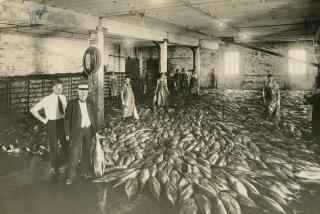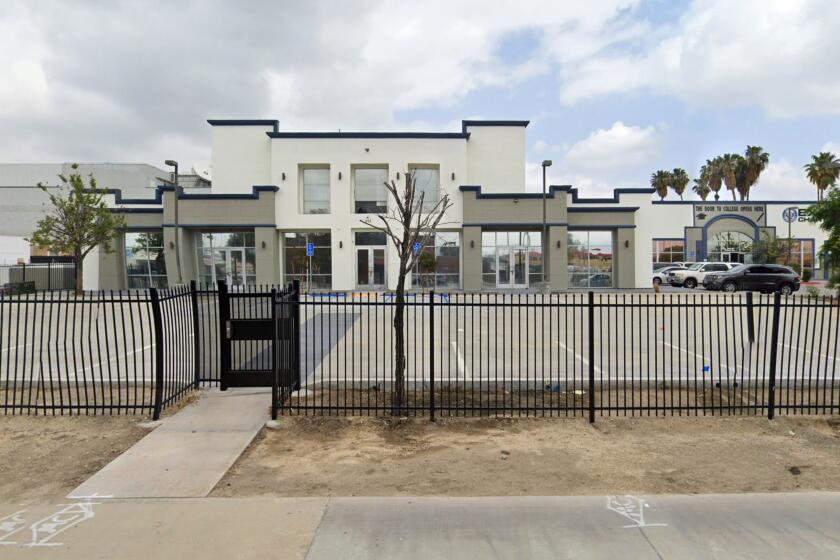The fleeting memories of Angel Island
Living memory has a way of disappearing fast. Before you know it, those who were there are gone.
Now 72 years after the Angel Island Immigration Station closed its doors, maybe a couple hundred people still remember firsthand what it was to travel by boat thousands of miles to California only to be held for days, weeks or months in guarded wooden barracks surrounded by San Francisco Bay.
Those who do remember are getting on now. And they were very young then.
So mostly their memories of their stay on the island have a blurry-edged, childlike feel.
Myron Wong, 83, who came from China in the station’s final year, 1940, recalls tossing around a tennis ball and watching men play pool. He didn’t know anything of Angel Island’s grim history, he said. “My brother and I just played.”
Marye Kimoto, 88, of Culver City, can still describe the shoe boxes with small dolls tucked inside that she and her sister, Bess Saito, 87, were given when they were held on the island for a week in the early 1930s.
“We as Japanese didn’t have to suffer like the Chinese people did,” Kimoto said. “We just ran around and had a good time.”
Wong, Kimoto and Saito were among five former detainees who attended an award ceremony at the Autry National Center on Wednesday. The Griffith Park museum was giving a $10,000 prize to the nonprofit Angel Island Immigration Station Foundation, which works to restore and preserve the station and to educate people about what happened there.
One of the foundation’s priorities has been collecting oral histories while it can.
“The only way that history becomes alive and relevant is through personal stories,” said the foundation’s executive director, Eddie Wong.
The East Coast had Ellis Island. The West had Angel Island. But the populations moving through the two gateways were different. The majority of immigrants who went to Angel Island were Asian, Chinese in particular. From 1910 to 1940, about 175,000 Chinese were held there as they tried to get into a country that did not welcome them.
The Chinese Exclusion Act of 1882 strictly limited how many Chinese could enter the United States, leaving an ocean between parents and children, husbands and wives.
Many of the Chinese coming in did so as “paper sons,” claiming U.S. citizenship and blood relations they did not have. At Angel Island, they were often interrogated at length, scared and humiliated. In later years, many never spoke of it, which has made collecting histories challenging.
“No one wanted to talk about it because a great percentage were actually illegal,” Eddie Wong said.
One paper son was artist Tyrus Wong, 101, of Sunland. At the Autry, as he sat in the front row, a video of him played on a big screen.
In it, he told of being separated on the island from his father, the only child in sight. A guard gave him a piece of gum, which he chewed and chewed until it had no taste and then turned into a lonely boy’s only toy. He was nervous, waiting to be interrogated about an identity he had been memorizing for months.
“Nine years old, I was scared half to death,” he said.
After the prize ceremony, the Angel Island alumni met and posed together for pictures. Some stood talking, leaning on canes, in an interactive gallery that reproduces settings from a Chinese immigrant family’s life in early Los Angeles.
Against the backdrop of a Chinatown antique store, they told upbeat stories and said others who came before them were the ones who suffered.
Still, they said, on the island, they were children, alone and confused.
The two sisters, Kimoto and Saito, were born in California. Their family had returned to Japan for several years, but the girls and their father were on their way back to California for good when Bess got chicken pox on the boat trip.
They stayed on the island only about a week while she was quarantined. But during that time, the two girls — 5 and 6 — were separated from their father. They saw him through a fence once a day outside, and he passed them his dessert over a partition at mealtimes.
Myron Wong spoke of “having fun” on the island, of not knowing to worry since he was only a child.
But he also said that when he left China, he said goodbye to his mother, who stayed behind.
He was 10. U.S. immigration law wouldn’t let her in.
“I had no idea then,” he said, “but I never would see her again.”
More to Read
Start your day right
Sign up for Essential California for news, features and recommendations from the L.A. Times and beyond in your inbox six days a week.
You may occasionally receive promotional content from the Los Angeles Times.







